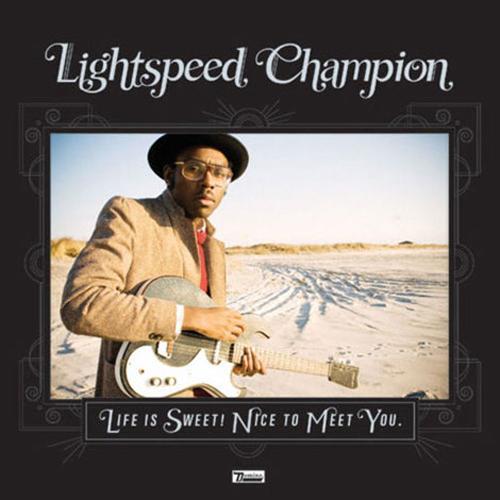
News
Pro-Palestine Encampment Represents First Major Test for Harvard President Alan Garber

News
Israeli PM Benjamin Netanyahu Condemns Antisemitism at U.S. Colleges Amid Encampment at Harvard

News
‘A Joke’: Nikole Hannah-Jones Says Harvard Should Spend More on Legacy of Slavery Initiative

News
Massachusetts ACLU Demands Harvard Reinstate PSC in Letter

News
LIVE UPDATES: Pro-Palestine Protesters Begin Encampment in Harvard Yard
Lightspeed Champion
"Life is Sweet! Nice to Meet You" (Domino) -- 3 STARS

Devonté Hynes can best be described as a dabbler. His upbringing shows signs of it: Hynes was born in Texas, raised in England and now lives in New York City. Within his artistic career it’s even more apparent. Hynes, also known as “Lightspeed Champion,” a name culled from a series of comic strips he once drew, has performed in just about every genre of music imaginable. His last group, Test Icicles, performed a combination of dance and punk, but now he performs his own blend of folk and indie rock, along with occasionally random sidesteps like an album entirely devoted exclusively to Green Day covers.
This variety makes Hynes’ newest album, “Life is Sweet! Nice to Meet You,” difficult to classify. It is too emotionally charged to be relaxed, but too relaxed to be emotionally moving. Hynes has settled down from the first Lightspeed Champion album, 2008’s “Falling off Lavender Bridge,” in which quiet and underwhelming music masked angry self-loathing lyrics. However, “Life is Sweet! Nice to Meet You” is a confused record. It is comprised of angry break-up ballads and swelling choruses interspersed with gentler piano sonatas and strummed ukuleles. The album’s lyrics are often predictably regular, which is disappointing given the innovative songwriting.
The musical variety is the greatest strength of “Life is Sweet! Nice to Meet You.” No two tracks sound even vaguely similar and this serves to liven up a lyrically simple album. When this music isn’t enough to carry the song, though, the lyrics are too thin to pick up the burden, and the track quickly falls flat. Most choruses are excessively simple—eight or nine word phrases that are repeated over and over again for the length of time necessary between equally short verses.
The best tracks are those where the musical background is sufficiently engaging. In track three, “There’s Something Underwater,” Hynes enters with ukulele chords, leading into a swelling chorus that feels hymnal, reminiscent of an epic Sufjan Stevens’s song. It’s a simple composition, and while the lyrics are as predictable as on the rest of the album—Hynes seems to be striving the use the phrase “I miss you” a record number of times for a four minute song—it is a thoroughly enjoyable slice of nostalgia nonetheless.
Following on from this is “Intermission,” 39 seconds of unconnected, vaguely musical noises, which somehow work within the structure of the album. There is so much variety within the musical styles that this diversion seems appropriate, showcasing yet another side of Hynes’ musical smorgasbord.
On the fifth track, “Faculty of Tears” Hynes brings in yet another delightful instrumental element with the appearance of a violin, plucked lightly under the otherwise a capella chorus and sweeping above the verses. Mixed together with the otherwise simple percussion and guitar background, the violin elevates the track, making the final instrumental minute and a half just as enjoyable as the rest of the song.
By contrast, “Madame Van Damme” lacks any of this musical intrigue, and without it the focus falls on the lyrics. The chorus of “Kill me baby / Won’t you kill me,” is somewhat charming at first, but when it is repeated for the final 55 seconds, it loses its resonance and feels trite.
This failing is also apparent on “The Big Guns of Highsmith,” a track whose chorus is the confused, and eventually annoying “Hurts to be the one who’s always feeling sad / Oh just stop complaining, Oh just stop complaining.” Left alone with nothing but a bare piano accompaniment, the lyrics feel whiney and self-indulgent instead of meaningful.
One of the final songs, the instrumental “Etude Op. 3,” reiterates how Hynes’ talent for creating exciting and highly detailed melodies is the key to the album’s success. Fluttering higher scales are transposed over nostalgic lower chords reminiscent of spring days, a testament to the beauty Hynes’s music can achieve when left alone, with no lyrics to distract from its elegance.
“Life is Sweet! Nice to Meet You” is an enjoyable album with moments of true elegance and beauty. The instrumental numbers—which comprize four out of the 15 tracks—are all lovely, and when Hynes focuses on this aspect of his music, the album is exceptional. Unfortunately, when the instrumental innovation falls away, the lyrics rarely have the depth or character to engage, and Lightspeed Champion sadly slips into the shadows.
Want to keep up with breaking news? Subscribe to our email newsletter.
